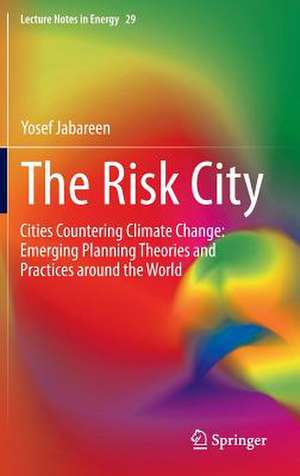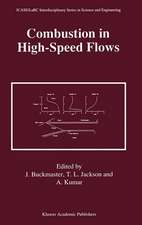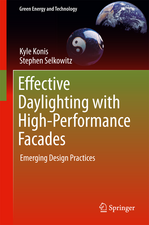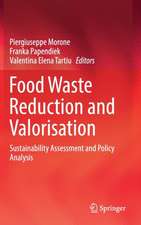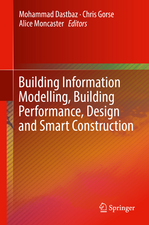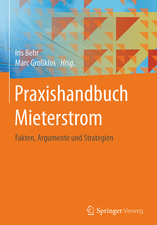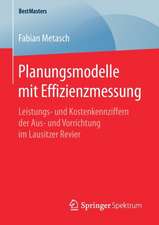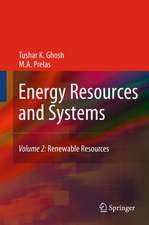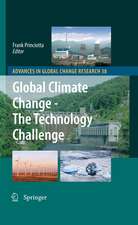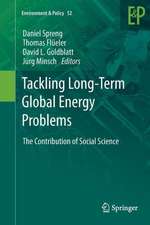The Risk City: Cities Countering Climate Change: Emerging Planning Theories and Practices around the World: Lecture Notes in Energy, cartea 29
Autor Yosef Jabareenen Limba Engleză Hardback – 11 mai 2015
In light of the complex challenges and risks to the human habitat that have emerged in recent years, many cities have prepared various types of plans aimed at addressing the challenges posed by climate change. Nonetheless, despite the importance of these plans and the major public resources invested in their formulation, we still know little about them and have yet to begin studying them and assessing their contributions
. From the innovative perspective of the risk city, this book asks critical questions about the nature, vision, practices, and potential impact of the recent climate change-oriented plans. What kinds of risks do they attempt to address, what types of practices do they institute, and what types of approaches do they apply? Do they adequately address the risks and uncertainties posed? How do they contribute to the worldwide effort to reduce greenhouse gas emissions? This book uses the methodologically innovative Risk City framework to examine the nature, vision, outcomes, practices, and impact of these crucial plans, as well as their contribution to the resilience of our cities and to global efforts toward reducing greenhouse gas emissions.
| Toate formatele și edițiile | Preț | Express |
|---|---|---|
| Paperback (1) | 383.93 lei 6-8 săpt. | |
| SPRINGER NETHERLANDS – 23 oct 2016 | 383.93 lei 6-8 săpt. | |
| Hardback (1) | 391.22 lei 6-8 săpt. | |
| SPRINGER NETHERLANDS – 11 mai 2015 | 391.22 lei 6-8 săpt. |
Din seria Lecture Notes in Energy
-
 Preț: 436.35 lei
Preț: 436.35 lei - 15%
 Preț: 655.60 lei
Preț: 655.60 lei - 18%
 Preț: 952.09 lei
Preț: 952.09 lei - 18%
 Preț: 1012.84 lei
Preț: 1012.84 lei - 15%
 Preț: 635.80 lei
Preț: 635.80 lei - 15%
 Preț: 645.96 lei
Preț: 645.96 lei - 15%
 Preț: 645.47 lei
Preț: 645.47 lei - 15%
 Preț: 640.06 lei
Preț: 640.06 lei - 15%
 Preț: 649.71 lei
Preț: 649.71 lei - 15%
 Preț: 643.84 lei
Preț: 643.84 lei - 18%
 Preț: 954.31 lei
Preț: 954.31 lei - 15%
 Preț: 643.84 lei
Preț: 643.84 lei - 18%
 Preț: 949.73 lei
Preț: 949.73 lei - 18%
 Preț: 1411.69 lei
Preț: 1411.69 lei - 15%
 Preț: 634.18 lei
Preț: 634.18 lei - 15%
 Preț: 649.87 lei
Preț: 649.87 lei - 15%
 Preț: 642.03 lei
Preț: 642.03 lei - 18%
 Preț: 957.62 lei
Preț: 957.62 lei - 15%
 Preț: 652.49 lei
Preț: 652.49 lei - 18%
 Preț: 963.15 lei
Preț: 963.15 lei -
 Preț: 361.03 lei
Preț: 361.03 lei -
 Preț: 391.79 lei
Preț: 391.79 lei - 15%
 Preț: 646.11 lei
Preț: 646.11 lei -
 Preț: 394.29 lei
Preț: 394.29 lei - 18%
 Preț: 954.45 lei
Preț: 954.45 lei - 18%
 Preț: 957.62 lei
Preț: 957.62 lei - 15%
 Preț: 647.27 lei
Preț: 647.27 lei - 18%
 Preț: 960.30 lei
Preț: 960.30 lei - 18%
 Preț: 1250.74 lei
Preț: 1250.74 lei - 15%
 Preț: 642.18 lei
Preț: 642.18 lei - 15%
 Preț: 639.41 lei
Preț: 639.41 lei -
 Preț: 488.71 lei
Preț: 488.71 lei - 18%
 Preț: 1677.21 lei
Preț: 1677.21 lei
Preț: 391.22 lei
Nou
Puncte Express: 587
Preț estimativ în valută:
74.86€ • 78.17$ • 61.82£
74.86€ • 78.17$ • 61.82£
Carte tipărită la comandă
Livrare economică 15-29 aprilie
Preluare comenzi: 021 569.72.76
Specificații
ISBN-13: 9789401797672
ISBN-10: 9401797676
Pagini: 202
Ilustrații: XV, 204 p. 36 illus.
Dimensiuni: 155 x 235 x 20 mm
Greutate: 0.49 kg
Ediția:2015
Editura: SPRINGER NETHERLANDS
Colecția Springer
Seria Lecture Notes in Energy
Locul publicării:Dordrecht, Netherlands
ISBN-10: 9401797676
Pagini: 202
Ilustrații: XV, 204 p. 36 illus.
Dimensiuni: 155 x 235 x 20 mm
Greutate: 0.49 kg
Ediția:2015
Editura: SPRINGER NETHERLANDS
Colecția Springer
Seria Lecture Notes in Energy
Locul publicării:Dordrecht, Netherlands
Public țintă
ResearchCuprins
List of Figures.- List of Tables.- Acknowledgments.- 1: Introduction.- 2: Theorizing the Risk City.- 3: Planning Practices for Cities Countering Climate Change.- 4: Assessment Methods: Planning Practices Countering Climate Change.- 5: Planning Practices of the Risk City around the World.- 6: Applying the Countering Climate Change Evaluation Method to a City Plan.- 7: Contemporary Planning of the Risk City: The Case of New York City.- 8: The Risk City Resilience Trajectory.- 9: The Deficient Resilient Cities: Hurricane Sandy in New York City.- 10: Vulnerability and uncertainty of extreme space weather events.- 11: The Urban Vulnerability Matrix.- Bibliography.
Recenzii
“Students, planners and managers in urban planning will find this book valuable because it strives to link conceptual knowledge about infrastructure with climate change knowledge. … The author has done an admirable job presenting the need for adapting to climate change and provides a worthwhile and informative discussion on new approaches and considerations for urban planners as we move forward into uncharted territory.” (Jeff Thurston, 3D Visualization World Magazine, 3dvisworld.com, July, 2015)
Notă biografică
Yosef Jabareen graduated with distinction from the Graduate School of Design at Harvard University, and has a Ph.D. in urban planning from Technion Institute of Technology, Haifa, Israel. He was a visiting scholar and lecturer in the Department of Urban Studies and Planning at MIT Massachusetts Institute of Technology, Cambridge. Visiting Fellow at Aga Khan Program for Islamic at MIT. The author is theorist of urban planning and politics. He writes in contemporary theories and practices in the fields of urban sustainability, climate change, and the resilient city. In addition, he writes on urban rights and politics and the status of minorities and marginalized groups. Jabareen won various academic awards.
Textul de pe ultima copertă
Contemporary cities face phenomenal risks, and they face particularly high levels of mounting social and environmental risks, including social polarization, urban conflicts, riots, terror, and climate change threats. This book suggests that climate change and its resulting uncertainties challenge the concepts, procedures, and scope of conventional approaches to planning, creating a need to rethink and revise current planning methods. Therefore, this book suggests a paradigm shift in our thinking, interrogation, and planning of our cities. Based on the contemporary conditions of risk at cities, this book conceptualizes the risk city as a construct of three interlinked concepts of risk, trust, and practice. It is a construct of risk and its new evolving conditions and knowledge of uncertainties stem from climate change and other risks and uncertainties. As a construct of practices, the risk city produces social and political institutional framework and promotes practices accordingly in order to reduce risk and risk possibilities and to increase trust.
In light of the complex challenges and risks to the human habitat that have emerged in recent years, many cities have prepared various types of plans aimed at addressing the challenges posed by climate change. Nonetheless, despite the importance of these plans and the major public resources invested in their formulation, we still know little about them and have yet to begin studying them and assessing their contributions
. From the innovative perspective of the risk city, this book asks critical questions about the nature, vision, practices, and potential impact of the recent climate change-oriented plans. What kinds of risks do they attempt to address, what types of practices do they institute, and what types of approaches do they apply? Do they adequately address the risks and uncertainties posed? How do they contribute to the worldwide effort to reduce greenhouse gas emissions? This book uses the methodologically innovative Risk City framework to examine the nature, vision, outcomes, practices, and impact of these crucial plans, as well as their contribution to the resilience of our cities and to global efforts toward reducing greenhouse gas emissions.
In light of the complex challenges and risks to the human habitat that have emerged in recent years, many cities have prepared various types of plans aimed at addressing the challenges posed by climate change. Nonetheless, despite the importance of these plans and the major public resources invested in their formulation, we still know little about them and have yet to begin studying them and assessing their contributions
. From the innovative perspective of the risk city, this book asks critical questions about the nature, vision, practices, and potential impact of the recent climate change-oriented plans. What kinds of risks do they attempt to address, what types of practices do they institute, and what types of approaches do they apply? Do they adequately address the risks and uncertainties posed? How do they contribute to the worldwide effort to reduce greenhouse gas emissions? This book uses the methodologically innovative Risk City framework to examine the nature, vision, outcomes, practices, and impact of these crucial plans, as well as their contribution to the resilience of our cities and to global efforts toward reducing greenhouse gas emissions.
Caracteristici
A clear, easy to grasp and comprehensive theoretical and practical approach to counter climate change in the urban context Encompasses the theories by incorporating the various social, economic, institutional, spatial, energy, and environmental aspects of how cities counter climate change impacts A master plan of 100 cities throughout the world is presented and compared in light of the presented theories Includes supplementary material: sn.pub/extras
